|
|
The Holy Martyr Polyeuctus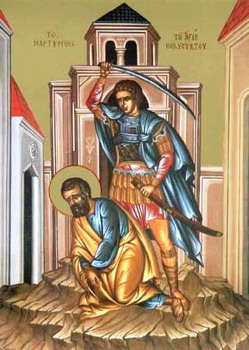 The Armenian town of Melitene was soaked in Christian blood, as was all the land of Armenia. The first blood shed for Christ in that town was that of St Polyeuctus, spilled in about the year 259, during the reign of Valerian. There were in the town two friends who were officers: Nearchus and Polyeuctus, the former baptised and the latter unbaptised. When a decree went out from the Emperor that all Christians were to be killed, Nearchus prepared himself for death, though with great sorrow at not having brought his friend Polyeuctus to the true Faith. When Polyeuctus became aware of Nearchus" sorrow, he promised to become a believer. On the following day, he related to Nearchus a dream that he had: the Lord Himself had appeared to him in light, stripped his old clothing from him, clothed him in new and shining raiment and set him upon the saddle of a winged horse. After relating this dream, Polyeuctus went off to the town, tore up the royal decree on the persecution of Christians and smashed many statues of idols. He was tortured and condemned to death. On the way to the place of execution, he caught sight of Nearchus in the crowd and called joyfully to him: "Save your soul, my dear soul-friend! Remember the vow of love confirmed between us!" And St Nearchus later ended a martyr for Christ in the fire. His feast is on April 22nd. The Armenian town of Melitene was soaked in Christian blood, as was all the land of Armenia. The first blood shed for Christ in that town was that of St Polyeuctus, spilled in about the year 259, during the reign of Valerian. There were in the town two friends who were officers: Nearchus and Polyeuctus, the former baptised and the latter unbaptised. When a decree went out from the Emperor that all Christians were to be killed, Nearchus prepared himself for death, though with great sorrow at not having brought his friend Polyeuctus to the true Faith. When Polyeuctus became aware of Nearchus" sorrow, he promised to become a believer. On the following day, he related to Nearchus a dream that he had: the Lord Himself had appeared to him in light, stripped his old clothing from him, clothed him in new and shining raiment and set him upon the saddle of a winged horse. After relating this dream, Polyeuctus went off to the town, tore up the royal decree on the persecution of Christians and smashed many statues of idols. He was tortured and condemned to death. On the way to the place of execution, he caught sight of Nearchus in the crowd and called joyfully to him: "Save your soul, my dear soul-friend! Remember the vow of love confirmed between us!" And St Nearchus later ended a martyr for Christ in the fire. His feast is on April 22nd.Our Holy Father Eustratius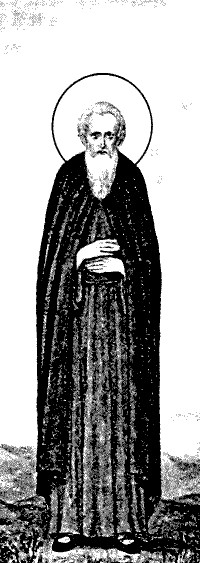 A native of Tarsus, he was a great ascetic and man of prayer. During seventy-five years of monastic life, he never lay on his left side to sleep, but always on his right. In church, he repeated over to himself throughout the service: "Lord, have mercy". He died at the age of 95. A native of Tarsus, he was a great ascetic and man of prayer. During seventy-five years of monastic life, he never lay on his left side to sleep, but always on his right. In church, he repeated over to himself throughout the service: "Lord, have mercy". He died at the age of 95.St Philip, Metropolitan of Moscow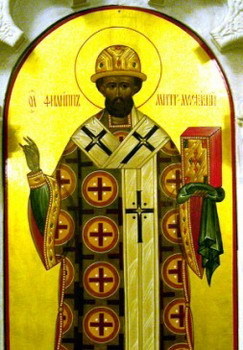 Born on February I 1 th, 1507, he was standing one day in church, while still a young man, when he heard the priest read from the Gospel the words: "No man can serve two masters" (Matt. 6:24). He was filled with awe at these words, as though they were said to him alone, and was enlightened in that same moment. He went off to the monastery of Solovetzk, where, after a long and hard novitiate, he received the monastic habit. In time he became abbot, and, resplendent as the sun in holiness, became known throughout the land of Russia. Because of this, Tsar Ivan the Terrible translated him to the vacant See of Moscow as Metropolitan in 1566. But the holy man could not witness with indifference the atrocities of that terrible Tsar, but counselled him strongly and then fearlessly denounced him. The Tsar found false witnesses against Philip, dismissed him, stripped him of all but his simple monastic rank and imprisoned him at Tver. On December 23rd, 1569, Malyuta Skhuratov, an emissary of the Tsar, came into Philip's cell and suffocated him with a pillow. But a horrible death quickly overtook all who had opposed Philip.
After some years, the body of the saint was found to be whole and uncorrupt, and giving off a fragrant odour. It was transferred to the monastery of Solovetzk. Born on February I 1 th, 1507, he was standing one day in church, while still a young man, when he heard the priest read from the Gospel the words: "No man can serve two masters" (Matt. 6:24). He was filled with awe at these words, as though they were said to him alone, and was enlightened in that same moment. He went off to the monastery of Solovetzk, where, after a long and hard novitiate, he received the monastic habit. In time he became abbot, and, resplendent as the sun in holiness, became known throughout the land of Russia. Because of this, Tsar Ivan the Terrible translated him to the vacant See of Moscow as Metropolitan in 1566. But the holy man could not witness with indifference the atrocities of that terrible Tsar, but counselled him strongly and then fearlessly denounced him. The Tsar found false witnesses against Philip, dismissed him, stripped him of all but his simple monastic rank and imprisoned him at Tver. On December 23rd, 1569, Malyuta Skhuratov, an emissary of the Tsar, came into Philip's cell and suffocated him with a pillow. But a horrible death quickly overtook all who had opposed Philip.
After some years, the body of the saint was found to be whole and uncorrupt, and giving off a fragrant odour. It was transferred to the monastery of Solovetzk.Prophet Shemaiah (Samaia, Semeias)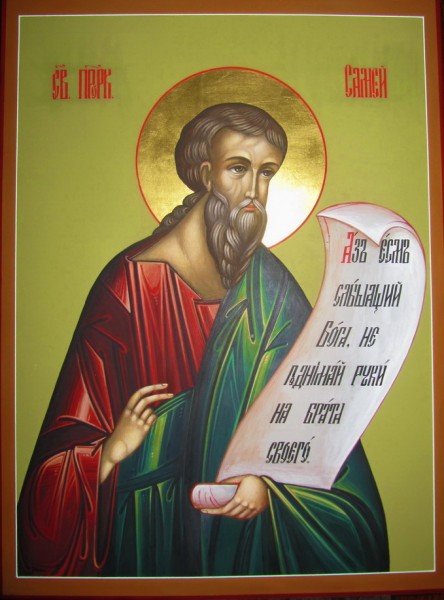 The Prophet Samei (Shemaiah) lived under king Solomon and his son Rehoboam, whom the prophet before the face of God forbade to war against the 10 Tribes of Israel, which separated themselves from the offspring of David (3 [1] Kings 12). The Prophet Samei (Shemaiah) lived under king Solomon and his son Rehoboam, whom the prophet before the face of God forbade to war against the 10 Tribes of Israel, which separated themselves from the offspring of David (3 [1] Kings 12).St. Peter, bishop of Sebaste in Armenia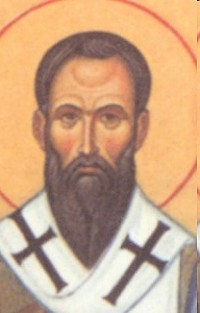 Sainted Peter, Bishop of Sebasteia, was a brother of Sainted Basil the Great and Sainted Gregory of Nyssa (Comm. 1 January and 10 January). And in his upbringing a large part was played by his older sister, Saint Macrina (Comm. 19 July).
Sainted Basil the great consecrated Saint Peter as presbyter, and after the death of Saint Basil he was made bishop of Sebasteia (in Armenia). Saint Peter was present at the Second OEcumenical Council in the year 381, convened at Constantinople against the heresy of Macedonias. Sainted Peter, Bishop of Sebasteia, was a brother of Sainted Basil the Great and Sainted Gregory of Nyssa (Comm. 1 January and 10 January). And in his upbringing a large part was played by his older sister, Saint Macrina (Comm. 19 July).
Sainted Basil the great consecrated Saint Peter as presbyter, and after the death of Saint Basil he was made bishop of Sebasteia (in Armenia). Saint Peter was present at the Second OEcumenical Council in the year 381, convened at Constantinople against the heresy of Macedonias. |